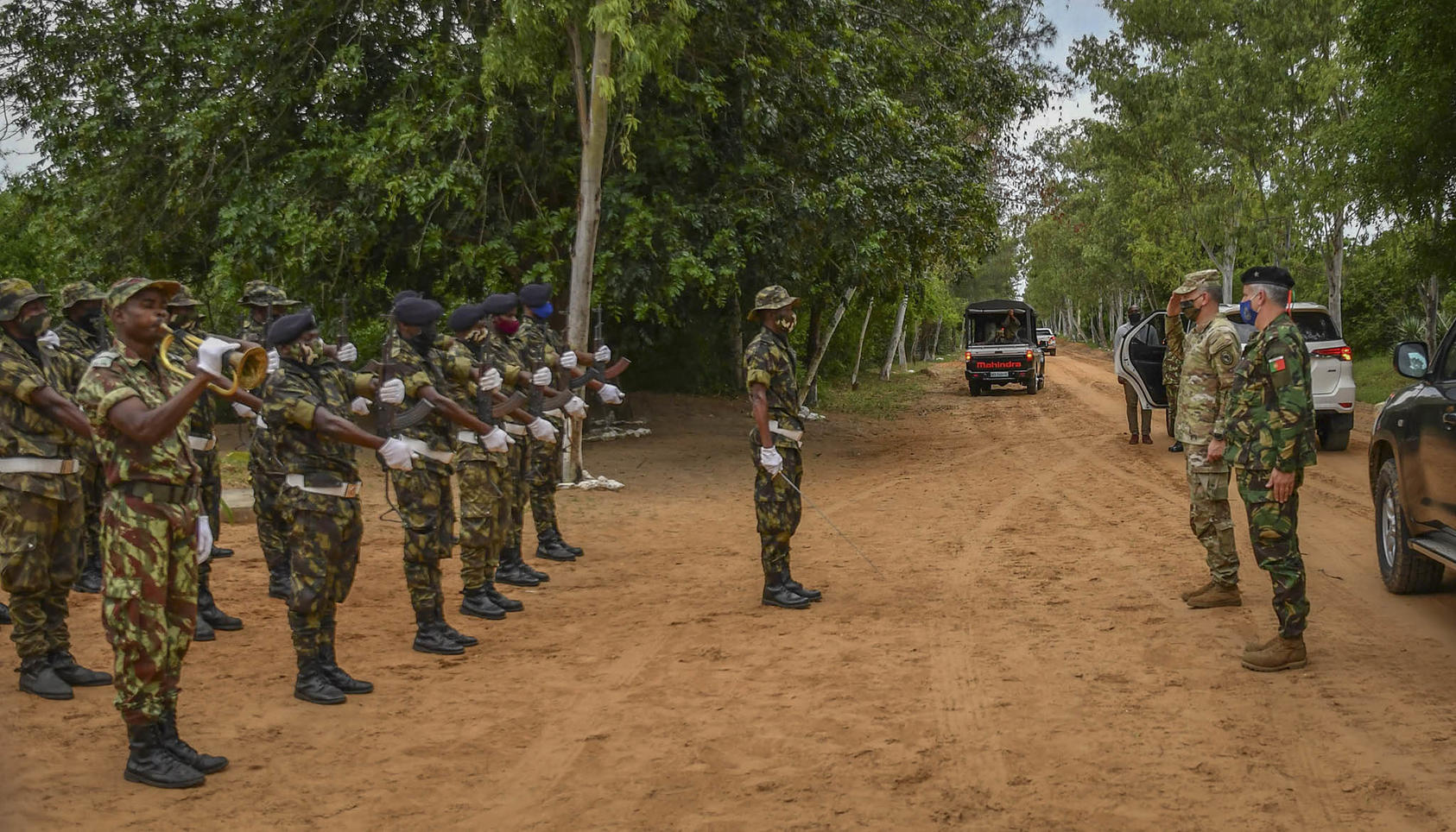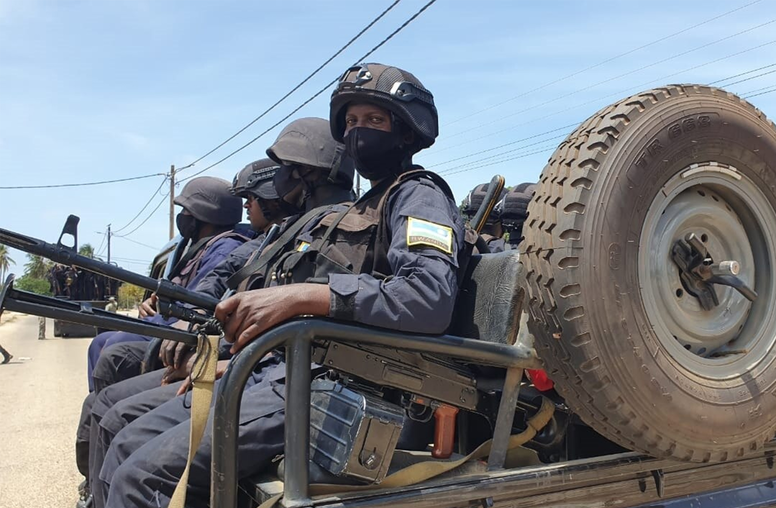Regional Security Support: A Vital First Step for Peace in Mozambique
Southern African countries and Rwanda pulled the country’s north back from the brink. It’s an opportunity that must be seized.
Over the last year, Mozambique has seen a marked improvement in security conditions in its troubled Cabo Delgado region. The military intervention of Southern African Development Community (SADC) member states and Rwanda has disrupted an Islamist insurgency that emerged in 2017 and has since inflicted an enormous toll on the region. Security in key areas of Cabo Delgado and neighboring provinces has stabilized, giving the Mozambican government — and its international backers — an opportunity to foster reconciliation leading to an enduring peace. The Mozambican government should immediately take advantage of this exceptional regional commitment, which won’t last forever.

Islamic State-affiliated insurgents, known locally as “al-Shabaab,” first struck in 2017, attacking three police stations in Cabo Delgado’s strategic coastal city of Mocimboa da Praia, killing 17. The next year, these insurgents spoke publicly of imposing Shariah law. A 2020 land-sea assault gave al-Shabab brief control of Mocimboa da Praia, as their attacks intensified throughout Cabo Delgado. In 2021, the city of Palma fell to insurgents. To date, hundreds of government security forces and thousands of civilians have been killed, with some 850,000 Mozambicans (including 400,000 children) displaced. While the insurgents’ motives remain murky, their brutality and the devastation they have unleashed undermines any professed concern for fellow Mozambicans.
Maputo’s Slow Response
The Mozambican government was criticized for initially downplaying the threat and delaying SADC intervention as the insurgency grew in scope and sophistication. Maputo initially turned to private security firms to combat the insurgents, namely the Russian-based Wagner Group and the Dyck Advisory Group, based in South Africa. Both organizations, with limited resources and missions, failed to reverse the tide of the insurgency. Nearly a dozen Wagner Group personnel were killed by insurgents.
While the Mozambican government was late in recognizing the danger of the growing insurgency, SADC was also slow to coalesce due to frictions among its members. It was clear early on that Mozambican security forces lacked the ability to combat the insurgency. Operating effectively in vast, heavily forested northern Mozambique would be challenging for any security force and proved particularly difficult for the poorly resourced and undertrained Mozambique Defence Armed Forces.
Regional Recognition of the Challenge in Cabo Delgado
On July 15, 2021, the Mozambican government approved the deployment of some 2,000 troops from eight SADC nations to Cabo Delgado, constituted as the SADC Mission in Mozambique (SAMIM). After reaching agreement with the Mozambican government, Rwanda, a non-SADC member, had sent 1,000 soldiers to Cabo Delgado a week earlier. Southern African nations have made this commitment to Mozambique because they are concerned that its insurgency threatens their own security, regional integration and economic development.
Today, while deadly insurgent attacks, mainly against civilians, still occur, Cabo Delgado is more secure due to SAMIM and Rwandan military operations against the insurgency. Security is particularly improved in the key cities of Mocimboa da Praia, the provincial capital city of Pemba and Palma. The head of the South African National Defense Force recently claimed that SAMIM had inflicted “massive losses” on the insurgents and the mission was extended in January.
The SADC deployment represents a considerable investment by participating states, all of which are struggling economically, facing the impact of COVID and fuel and food price spikes driven by Russia’s war on Ukraine. While SAMIM has received financial support from the European Union, the deployment costs an estimated $10 million a month. South Africa, Botswana, Lesotho and Tanzania have suffered troop fatalities in Mozambique. In short, SADC is acting in the common defense, just as a regional organization should.
Mozambicans have generally welcomed the SADC forces. International peacekeepers have a mixed history, and in some cases are seen as abusive foreign forces. So far though, there have been few reports of abuses by foreign troops in Cabo Delgado. Suspicion of motives does exist, with some assuming that Rwanda struck a quiet deal with France or France-based TotalEnergies, whose $20 billion-dollar natural gas project offshore of Cabo Delgado was forced to halt operations a year ago because of insurgent gains. While the government and its international partners should closely monitor foreign troops on Mozambican soil, SAMIM is helping to stabilize a country that suffered from a lengthy foreign-backed civil war from the start of its independence era and now faces an insurgency that routinely burns villages and beheads civilians. As one Mozambican civil society representative recently told us, the regional intervention “gives Mozambicans hope that they aren’t in this alone.”
Stabilization is Only Step One
The security gains must be deepened to advance the economic development the region’s citizens direly need. Driving away, degrading and demoralizing insurgents as SAMIM has done is an accomplishment. But local police forces in Cabo Delgado are woefully inadequate and under resourced. Some also lack the trust of the people, as they have often been considered part of an unjust government. One Mozambican civil society representative told USIP, “They only care about protecting the interests of the big companies.”
As SAMIN transitions to a more robust mandate, the expectation is that the mission will help the Mozambique government address instability in a more fundamental way, which could include helping to develop and professionalize local security forces. While popular now, SADC troops may wear out their welcome — foreign troops almost always do — and contributing nations may soon tire of their SAMIM commitment, which is being extended only in several month increments. Mozambique must prioritize developing its own security capacity.
The conflict in Cabo Delgado also must be addressed comprehensively, going well beyond security. The insurgency takes advantage of high youth unemployment and the resultant sense of hopelessness and disillusionment to win recruits. The people of Cabo Delgado rightly feel that the national government has never treated their region equitably, instead exploiting its abundant natural resources for the enrichment of a ruling elite. The potential development of Cabo Delgado’s massive natural gas resources is already stressing the province’s relationship with the national government.
Corruption runs deep, further inflaming resentment. Civil society in Cabo Delgado has little voice in politics and even fear speaking out. Reversing course in Mozambique will require a strong and broad political commitment by the national government, accompanied by financial resources, to achieve more transparent and participatory governance and an improved economy. The Botswanan head of SAMIM recently said social development must be part of the security equation. Working with international donors, the national government has developed a “Resilience and Development Strategy for the North,” but it has yet to receive final approval.
SAMIM is an encouraging and critical development. The SADC has never addressed regional insecurity with such a vigorous commitment. Whereas the United Nations, African Union and regional peacekeeping operations in the Democratic Republic of Congo, Central African Republic and Darfur, Sudan are sputtering with deadly consequences, SAMIM shows promise. This regional operation certainly has proven superior to the private security force model in Mozambique. Moreover, Mozambique desperately needs the help. Few observers doubt that Cabo Delgado and possibly neighboring provinces would fall into insurgent-driven chaos without outside security assistance at this point. While its “success” is far from guaranteed, SAMIM has bought time for the government of Mozambique to take the more fundamental approach to peace that is needed in Cabo Delgado.
A Model the U.S. Can Support
The United States has welcomed SAMIM. The commander of AFRICOM recently said, “They’re [insurgents] still there, but SADC’s operations have been quite effective and this is exactly the kind of solutions that the United States likes to see: solutions led by African partners, buttressed by other international partners, and supported by the United States where we can lend a hand.” This “lending hand” has been two month of U.S. trainings of the Mozambican military, complementing a 10-nation European Union training mission lead by Portugal.
Additional U.S. assistance could include advising SAMIM on building critical military-civilian relations. The 850,000 forcibly displaced Mozambicans are now living in temporary camps or in under resourced host communities. They need to return home. Working with the Cabo Delgado and national governments, civil society and the international community, a key function for SAMIM could be to strengthen “early recovery” in areas of return. This could entail facilitating the return of basic services, improving humanitarian access (especially health services for women and girls) and creating the conditions for commercial activity with the intention of revitalizing local economies. Such an approach also aligns with core government priorities, including reducing potential security threats within returning populations — who may be vulnerable to terrorist recruitment — as well as providing for the human security of at-risk groups, namely women and youth.
Driven by Africans, Mozambique represents hope on a continent where the United States and others have struggled particularly of late to promote peace and stability. Mozambique is important in U.S. Africa policy with its significant development potential, abundant natural resources, ecological importance and high regional standing. Given the substantial investment the United States makes in Mozambique — some $536 million in development aid in 2021 — and the country’s recent designation as one of countries included in the Strategy for Preventing Conflict and Promoting Stability, making an added modest investment in the critical security sector is warranted.
SADC has undertaken an impressive mission that deserves continued U.S. and international support. Of course, it is far from perfect and must be treated as only a first step toward peace in Mozambique. “The regional military response was essential but not sufficient,” said one Mozambican civil society representative. But neighboring countries have brought a badly needed degree of stability to an area that was suffering humanitarian devastation at the hands of Islamist insurgents.
A window of opportunity now exists to take the challenging steps of building Mozambican security capacities and greater economic and political inclusion and prosperity in Cabo Delgado and neighboring provinces. These are steps for the government of Mozambique to take with urgency and the support and, perhaps pressure, of the international community.
A previous version of this article incorrectly identified Palma as the provincial capital of Cabo Delgado.



